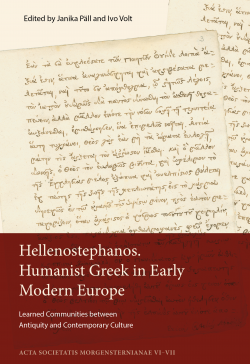Onlangs is een bundel verschenen over Grieks in de Renaissance. Onder meer ons lid Pieta van Beek heeft daaraan bijgedragen met een artikel over Anna Maria van Schurman’s correspondenties in het Grieks met onder anderen Meletios Pantogalus, Bathsua Makin, Claudius Salmasius en Johan van Beverwijck:
The rebirth of Ancient Greek in Europe was promoted by Humanist education and ideas to such an extent that we can consider the Greek language as a formative element of Humanist culture. Next to Latin, the default common language, a Humanist has to know and use Greek, because he is not, cannot and will not be a barbarian: βάρβαρος οὐ πέλομαι, as Julius Caesar Scaliger claimed in his verses in 1600.
Wreaths (στέφανοι) have been the symbols of the cult of Muses from ancient times. After the love for Greek Muses had been revived by Renaissance Humanist poets and scholars, it has remained with us both in poetic activity and in scholarship. The Hellenostephanos volume presents a collection of papers by scholars who study Humanist Greek, aspiring towards another revival of Hellenism, and trying to avoid being barbarians.
The volume includes papers by Christian Gastgeber, Gita Bērziņa, Janika Päll, Charalampos Minaoglou, Erkki Sironen, Kaspar Kolk, Tua Korhonen, Johanna Akujärvi, Bartosz Awianowicz, Jean-Marie Flamand, Walther Ludwig, Alessandra Lukinovich, Martin Steinrück, Tomas Veteikis, Grigory Vorobyev, Vlado Rezar, Pieta van Beek, and Antoine Haaker.
Janika Päll en Ivo Volt, red., Hellenostephanos. Humanist Greek in Early Modern Europe: Learned Communities between Antiquity and Contemporary Culture (Tartu: University of Tartu Press, 2018).
Voor meer informatie zie: https://www.tyk.ee/philology/00000012615.

